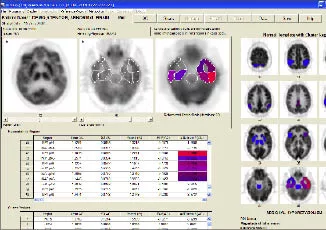
Home » New software is being used to help those with dementia
New software is being used to help those with dementia
Inland Imaging uses NeuroQ technology to improve diagnosis

January 29, 2009
Inland Imaging LLC, of Spokane, is now using new computer software that it says is providing improved diagnosis of dementia, enabling doctors to predict more accurately what the future holds for dementia patients, and provide the best possible treatment for and management of the illness.
"Dementia robs a person of the very nature of what it means to be him or her," says Dr. Justin P. Smith, a Seattle-based radiologist and nuclear medicine physician for Inland Imaging. "It strikes at the very core of what it is to be human."
The new software, NeuroQ, was developed by Atlanta-based Syntermed Inc. and the UCLA Medical Center, in Los Angeles. It analyzes images of the brain created by positron emission tomography/computed tomography, or PET/CT scans, and provides doctors with data that can be used in the diagnosis of all types of dementia and in tracking the progression of the brain-affecting condition.
Alzheimer's disease is the most common form of dementia. Alzheimer's causes tissue death and shrinkage of the brain. Identifying as well as possible the form of dementia that strikes a patient—whether it's Alzheimer's disease, Lewy body disease, vascular dementia, or another form—is important because the road ahead for patients with the different forms often is different, Smith says.
Although physicians cannot diagnose definitively some forms of dementia, including Alzheimer's disease, until a brain biopsy is done after a patient has died, NeuroQ increases the certainty of a very serious diagnosis of a life-changing ailment, says Smith. The software helps doctors predict patients' futures, and also helps doctors choose the best form of treatment and best care, he says.
NeuroQ works by comparing metabolic activity in 240 regions of the brain with a database of age-matched scans of patients with normal brains. Abnormal regions of the brain are identified based on the number of deviations between a patient's brain scan and those of normal patients.
Before Inland Imaging began using NeuroQ, radiologists visually evaluated a patient's brain scans, and used their experience and training to make a diagnosis.
"NeuroQ gets us past some of the subjectivity," says Smith. "It moves us right into an era of quantification. It's evidence-based medicine."
Inland Imaging began using the software on a trial basis last summer, and bought it shortly after that. Inland Imaging does not charge patients additionally when it opts to use NeuroQ.
Inland Imaging uses NeuroQ 3.0, which has been in use since March 2008.
Inland Imaging is doing the scans with NeuroQ in Spokane at its imaging center at Providence Sacred Heart Medical Center. Smith says the company is doing between three and five scans per week.
"I'd like to see it be used more widely," Smith says.
Michael Lee, based in Atlanta, Syntermed's chief executive officer, says Inland Imaging is the only medical provider in the Spokane area using NeuroQ.
Latest News
Related Articles

_web.webp?t=1769673727)
_web.webp?t=1769673728)
_web.webp?t=1769673735)
